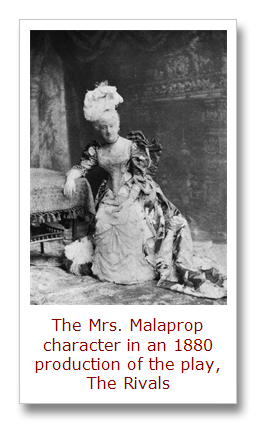The third time I heard someone say, just in a matter of days, that such-and-such an event was incredulous (instead of incredible), I thought I should write about it. There is no reason to confuse these two words. It would be nice if we could keep them separate.
Read MoreThis is the term that the Americans use for what we call Swiss cheese. They were taken to task by the cheese producers of France and Switzerland who wanted to claim that only the cheese produced in the Gruyère region of Switzerland and France could be given this name.
Read MoreThe politician talking on the radio said that something had ‘exasperated the situation’. I thought this might have been a slip of the tongue that can easily happen in an interview so I had a look on Google, not expecting to find much. Seven and a half million instances of ‘exasperated the situation’.
Read MoreWe were introduced to the expression top of mind in the 1950s when it was part of the jargon of advertising and marketing. These experts wanted to create the situation where a particular brand was top of mind, that is, at the forefront of a person’s awareness.
Read MoreThe Oxford English Dictionary gives this as the primary spelling although it lists femme sole as a variant. It translates into English as ‘single woman’. This description popped up in a Sydney title deed of 1958. This is an historical legal term dating back to British law of the 1600s. It is one of the many legal terms which the British acquired as a result of the Norman conquest.
Read MoreWe all know that we should use fewer when we are dealing with discrete units that are countable, and less when we/are dealing with a noun that cannot be counted.But what happens when we specify that there is one less. Immediately we are in a world of counting so it really should be one fewer.
Read MoreSome words have ended up with the same form in English today despite their different origins. There are other words that end up with forms dangerously close to each other so that we become confused about which is which.
Read MoreAgreeance is not a new form. It has been rising in frequency in Australia since the 1980s I think, usually in the phrase to be in agreeance with someone. It is as if we are making a distinction between an agreement, a document on the table, and agreeance, a state of mind.
Read MoreI have often thought that the best option for us all is to avoid the word comprise completely because it is so misunderstood. Mostly the confusion is that a parallel is drawn with consist of with the consequence that comprise is given a particle of that it doesn’t need or want.
Read MoreI expected this phrase with the meaning ‘through the perspective or viewpoint of’ to be a well-established expression but it seems that is not the case. The Oxford English Dictionary does not have it. I could track instances in Google back to the 2000 after which it became sporadic.
Read MoreI baulked at the phrase ‘prodigious and advanced students’ because, to my mind, a prodigious student must be huge — very, very tall and possibly obese. But, as I so often say to others, I must learn that language changes all the time and be accepting of such changes.
Read MoreWhy has the frequency of this word skyrocketed in the last few decades? I will cut straight to the chase and say that it is fashion. Multiple sounds more educated than many or several. It puts the speaker in the world of experts and specialists, whereas many and several are just commonspeak.
Read MoreWhy we have developed conventional ways of conferring the pronoun she on some things and he on others is, if not a mystery, then at least an area where one should tread carefully.
Read MoreTo say that something is a cakewalk means, to us, that it is easy to do. But there are those will look reprovingly at you for using this expression and point to its history in slavery in the U.S.
Read MoreI was reading an article titled World Englishes and Lexicography. The opening paragraph explained the notion that a variety of English that was supported by a dictionary was much more likely to be generally accepted than one didn’t have this basic reference tool. This is true although unfair. Think of the vibrancy of Indian English which still doesn’t have its own dictionary. And Singaporean English.
Read MoreA correspondent raised an interesting question. If someone flies from Sydney to Norfolk Island, once they have arrived, are they now 'at' 'in' or 'on' the Island?
Read MoreI was startled to hear recently about a secretive military base on the Western Australian coast line. The Chinese were being accused of spying on it.
I enjoyed the idea of the base whispering behind its hand or scuttling around in dark corners.
Read MoreIt seems that there’s is on the way to becoming a fused unit at the beginning of a sentence allowing both singular and plural to follow.
Read MoreMany guests on radio use this expression, to the point where one subscriber has become so irritated that I have been asked to comment on it.
Read MoreAccording to the American writer Lawrence Harrison, who coined the word in an article in the Washington Post in 1976, a malaphor is a blend of malapropism and metaphor.
Read More


















